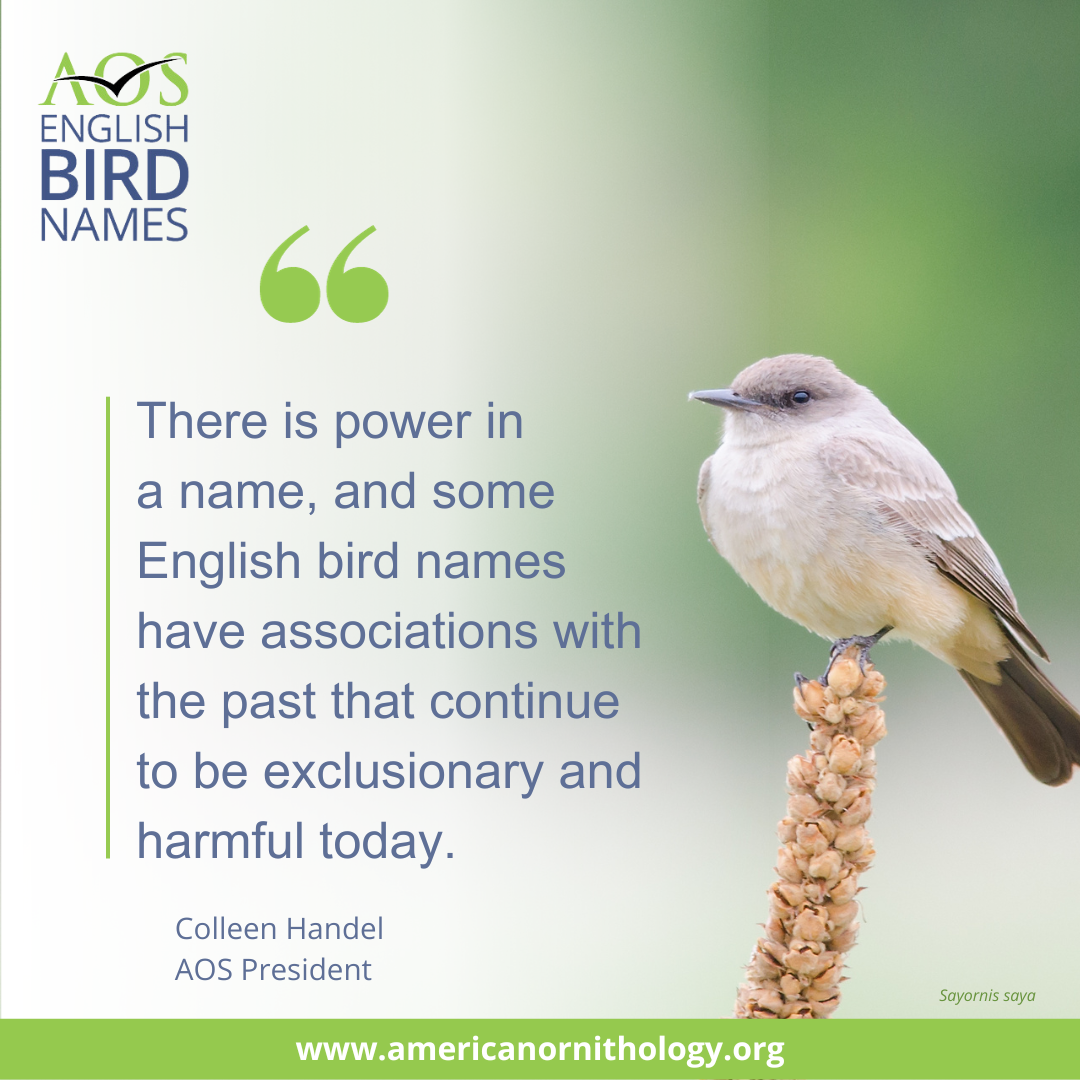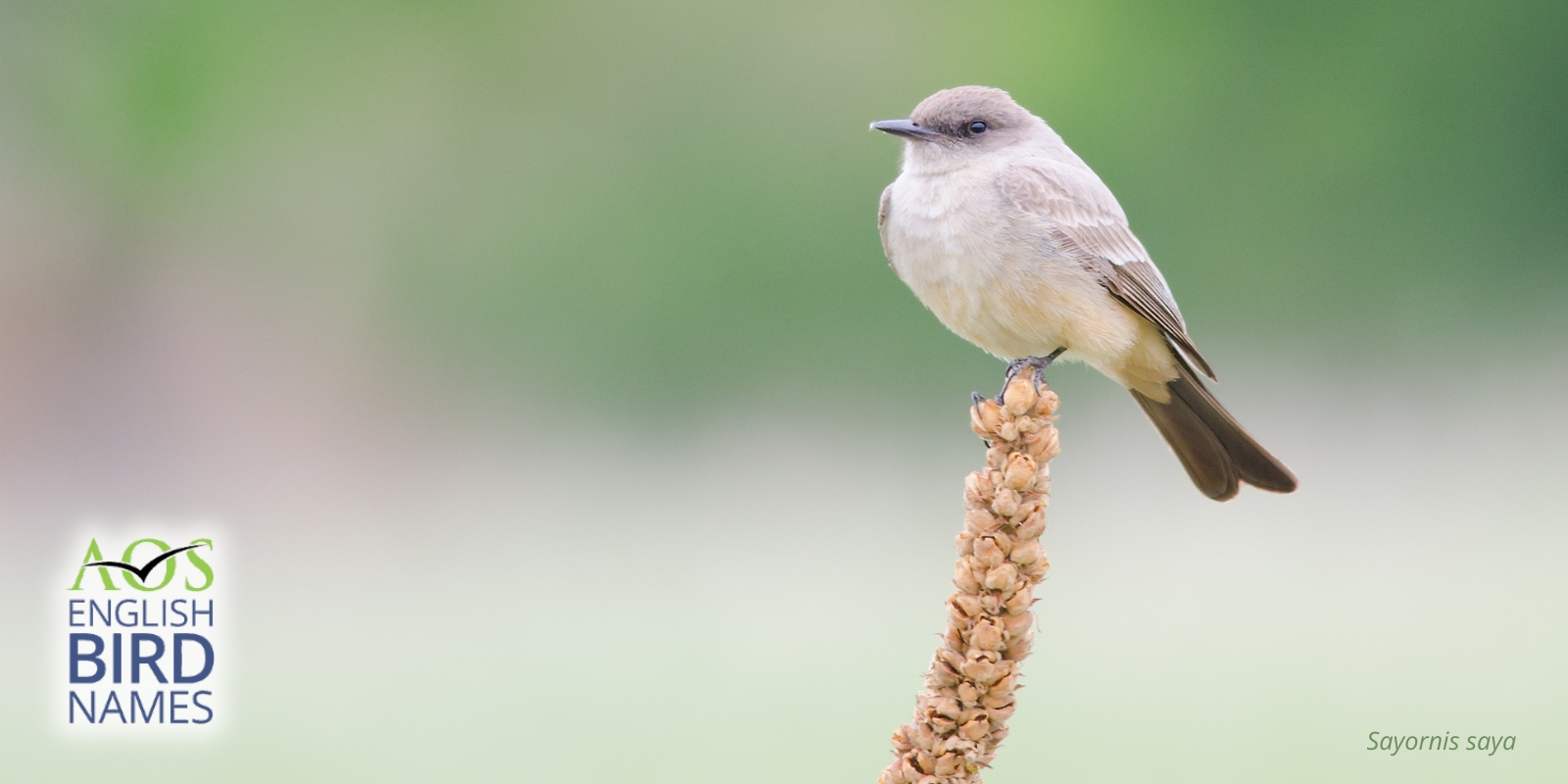“There is power in a name, and some English bird names have associations with the past that continue to be exclusionary and harmful today,” says president.
“The time has come for us to transform this process and redirect the focus to the birds, where it belongs,” says CEO.
FOR IMMEDIATE RELEASE
Contact: media@americanornithology.org
CHICAGO (November 1, 2023)—Today the American Ornithological Society (AOS) announced that in an effort to address past wrongs and engage far more people in the enjoyment, protection, and study of birds, it will change all English bird names currently named after people within its geographic jurisdiction. The AOS will also change the process by which English names are selected for bird species. The effort will begin in 2024 and will focus initially on 70–80 bird species that occur primarily within the U.S. and Canada.

“There is power in a name, and some English bird names have associations with the past that continue to be exclusionary and harmful today. We need a much more inclusive and engaging scientific process that focuses attention on the unique features and beauty of the birds themselves,” said AOS President Colleen Handel, Ph.D., a research wildlife biologist with the U.S. Geological Survey in Alaska. “Everyone who loves and cares about birds should be able to enjoy and study them freely—and birds need our help now more than ever.”
Ornithologists have long grappled with historical and contemporary practices that contribute to the exclusion of Black, Indigenous, and other people of color, including how birds are named. For example, in 2020, the AOS renamed a small prairie songbird found on the Great Plains to “Thick-billed Longspur.” The bird’s original name—honoring John P. McCown, an amateur naturalist who later became a general in the Confederate Army during the U.S. Civil War—was perceived as a painful link to slavery and racism.
Today, the AOS is taking decisive action to reframe the issue of birds named after people altogether. Specifically, the scientific society is announcing three changes to the way it and its predecessor organizations have operated since the 1880s:
- The AOS commits to changing all English-language names of birds within its geographic jurisdiction that are named directly after people (eponyms), along with other names deemed offensive and exclusionary, focusing first on those species that occur primarily within the U.S. or Canada.
- The AOS commits to establishing a new committee to oversee the assignment of all English common names for species within the AOS’s jurisdiction; this committee will broaden participation by including a diverse representation of individuals with expertise in the social sciences, communications, ornithology, and taxonomy.
- The AOS commits to actively involving the public in the process of selecting new English bird names.
“As scientists, we work to eliminate bias in science. But there has been historic bias in how birds are named, and who might have a bird named in their honor. Exclusionary naming conventions developed in the 1800s, clouded by racism and misogyny, don’t work for us today, and the time has come for us to transform this process and redirect the focus to the birds, where it belongs,” said Judith Scarl, Ph.D., AOS Executive Director and CEO. “I am proud to be part of this new vision and am excited to work in partnership with a broad array of experts and bird lovers in creating an inclusive naming structure.”
North America has lost nearly 3 billion birds since 1970. Says Scarl, “To reverse these alarming bird population declines, we need as many people as possible to get excited about birds and unite to protect them.”
Since 1886, the AOS and its predecessor, the American Ornithologists’ Union, have maintained a list of official English-language names for birds in North America (and more recently, South America). These names are widely used by schools and universities, government agencies, conservation organizations, the news media, artists and writers, birders and photographers, and many other members of the English-speaking public worldwide. These English names are often updated as scientists discover new information about the ecology and evolution of these birds.
In addition to their official English names, birds, like all living things, have a two-part scientific name that scientists use to communicate among themselves across languages and nationalities. For example, Haliaeetus leucocephalus is the scientific name for the Bald Eagle. Scientific names will not be changed as a part of the AOS English bird names initiative, but they are regularly reviewed and updated by the AOS’s North American and South American classification committees in response to new scientific research and following the naming rules of the International Commission on Zoological Nomenclature.
The AOS will conduct an open, inclusive, and scientifically rigorous pilot program in 2024 to develop its new approach to English bird names in the U.S. and Canada. Additionally, the AOS has come to see its authority over the English names of Latin American birds in a new light and has committed to engaging in a broader set of conversations with ornithologists and organizations in Latin America before proceeding with Latin American name changes. Interested parties are invited to follow this initiative’s progress at www.americanornithology.org and @AmOrnith on major social media platforms over the coming months and years.
About the American Ornithological Society
The American Ornithological Society (AOS) is an international society dedicated to connecting ornithologists, science, and bird conservation by supporting science that advances the understanding and conservation of birds; promoting broad access to ornithological science; supporting ornithologists throughout their career paths; and fostering a welcoming, diverse, supportive, and dynamic ornithological community. The AOS publishes two top-ranked international scientific journals, Ornithology and Ornithological Applications, and hosts an annual conference that attracts ornithologists from across the globe. Its robust grants program supports student and early-career professional research initiatives. The Society’s check-lists serve as the accepted authorities for scientific nomenclature and English common names of birds in the Americas. The AOS is also a partner with The Cornell Lab of Ornithology in the online Birds of the World, a rich database of species accounts of the world’s birds. The AOS is a 501(c)(3) nonprofit organization serving about 3,000 members globally. For more information, see www.americanornithology.org.
###

Great news! Thanks AOS and Bird Names for Birds!
If you’re going to change bird names because of some racist people, then it should be that way for everything, including the-Washington monument, Jefferson monument, anyone else who had slaves or took part in a war against any humanity, period. I’m not saying I disagree with the sentiment, because I don’t. I just feel that there’s a lesson to be learned here – it’s intolerance and ignorance. Bring your children up right, to accept everyone, and we will be able to avoid this going forward.
Sounds like a dumb idea to me. There are many birds named after ornithologists, such as the Audubon’s Oriole. What’s wrong with that? Geographic names are considered okay, but many geographic names are named after people, such as Baltimore Oriole comes from Lord Baltimore. Are they even going to change the name of extinct birds like the Eskimo Curlew? I sure hope they reconsider doing this!
Thank you for this statement. It feels meaningful that you are doing this both to address past wrongs AND to open the possibility for the study of birds to be inclusive and welcoming to a greater number of people. I suggest AOS might consider the Indigenous / pre-colonial names for the bird species that can be found in these lands, as an inspiration for selecting ‘new’ names.
This is really exciting to hear! I’m especially curious of what the names of some of California’s hummingbirds will be changed to. I hope this also happens in the field of botany as well. And there definitely needs to be consideration of pre-colonial names for all species.
Dear American Ornithological Society,
I am truly impressed by your recent initiative to rename North American birds, removing names associated with individuals linked to racism and oppression. This step undoubtedly helps combat racism, white supremacy, and promotes inclusivity within the field of ornithology.
I would like to offer a suggestion for new names that could honor influential and iconic figures such as George Floyd, Hasan Nasrallah, Yahya Sinwar, and Robert Mugabe. By naming these birds after individuals who have made significant contributions to society, you can further promote diversity and inclusiveness.
Thank you for your dedication to making the study and protection of birds a more inclusive and equitable endeavor. Your commitment to progress is truly commendable, and I look forward to seeing the positive impact of these changes in the future.
Sincerely,
Phineas Macclintock
Please rename the so-called Mockingbird. It is misleading and does not reflect the beauty of its enormous repertoire. They are long winded in spring/summer but MIMIC bird could more accurately describe them. Thanks for reading. Jean-Christophe Pouteau
Please rename the so-called Mockingbird. It is misleading and does not reflect the beauty of its enormous repertoire. They are long winded in spring/summer but MIMIC bird could more accurately describe them. Thanks for reading. Jean-Christophe Pouteau
If you must do this to our Western Jay consider “stellar” as in, exemplary, rather than Steller the name. Most people think the name is actually Stellar Jay – and it is a stellar jay!